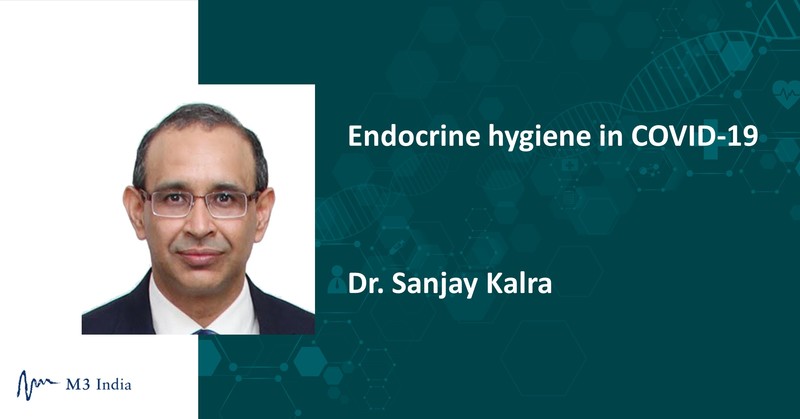Endocrine hygiene in COVID-19: Dr. Sanjay Kalra
M3 India Newsdesk Jun 23, 2020
Dr. Sanjay Kalra shares simple suggestions and optimum hygiene tips for physicians to protect patients with endocrine and metabolic disorders who may be more susceptible to infection.
For our comprehensive coverage and latest updates on COVID-19 click here.
Hygiene and health
Current times have highlighted the potential havoc that microorganisms can play on human health. Infections are not new to mankind. Ancient skeletons and mummies betray evidence of infectious disease such as tuberculosis. Pioneer physicians from India and Greece have written treatises on management of infection. Many of the Nobel Prizes for Medicine and Physiology have been awarded for contribution to infectious disease care.
Hygiene, or hygienic practices, have always been the bulwark of infection prevention. Hygienists, however, have never won accolades or laurels. Rather, Semmelweiss, who successfully practiced hand-washing to reduce the incidence of puerperal fever in 18th century Vienna, was hounded by the medical fraternity and committed to an asylum for the mentally ill.
Hygiene expanded
The term hygiene is a noun, but can be used as an adjective and a verb as well. Though Aristotle utilised hygiene as a synonym of health, the World Health Organization defines it as conditions and practices that help to maintain health and prevent the spread of disease. The word has lent itself to craft the concepts of social hygiene, occupational hygiene, and information hygiene, among others. Medical hygiene, for example, includes a specific set of practices associated with preservation of health, such as sterilisation, sanitisation, and sanitation.
Hygiene and COVID-19
COVID-19 has brought the term hygiene to the centre-stage of discussion and debate. To simplify matters, we list the various aspects of COVID-19 prevention under the rubric of hygiene (Table 1). Let us focus specifically on endocrine hygiene.
| Table 1: The pillars of hygiene against COVID-19 | |
| Personal hygiene | Frequent handwashing |
| Social hygiene | Physical distancing |
| Nutritional hygiene |
Healthy, balanced diet Functional foods for immunity |
| Medical hygiene |
Appropriate medication Good endocrine and vasculometabolic health |
| Information hygiene | |
Endocrine hygiene and COVID-19
Endocrine hygiene is defined as ‘conditions and practices that help to maintain health and prevent the development of endocrine and metabolic diseases’ (Kalra, Gupta, Sahay, 2016). This definition, however, seems incomplete today. We therefore suggest that endocrine hygiene be described as 'conditions and practices that help to maintain optimal endocrine and metabolic health, and prevent the occurrence of disease'. Armed with this understanding, we suggest the following:
Good glycaemic control helps in improving immunity, and in reducing the risk of hospitalisation due to COVID-19. It also facilitates better clinical outcomes. Therefore, timely screening, diagnosis and management of dysglycaemia is imperative in the prevention and management of COVID-19. We term this process as ‘glucovigilance’.
While standard of care must be followed in choosing glucose-lowering therapy, one must be mindful of potential limitations of certain drugs. Metformin can cause hyporexia or worsen anorexia, first generation sulfonylureas can lead to hypoglycaemia if food intake is hampered, and SGLT2 inhibitors may precipitate dehydration in such a situation.
Vasculometabolic hygiene & COVID-19
Hypertension, coronary artery disease, and chronic kidney disease, which are frequently associated with diabetes, are also linked with increased susceptibility to COVID-19 infection, and poorer outcomes. Therefore, appropriate management should be ensured for all vasculometabolic conditions.
The elderly, antenatal women, as well as persons with high-risk comorbidities, must be manged with special empathy. Teleconsultation where possible, priority appointments, and rapid turnaround times when they visit hospitals, will help reduce the potential of exposure to infection.
Immunity and nutrition
- Other endocrinopathies, if not managed properly can also predispose to viral infection. These include Cushing’s syndrome and congenital adrenal hyperplasia. These, too, must be managed as part of endocrine hygiene.
- Treatment that is ongoing for endocrine disease such as pituitary or thyroid disease, osteoporosis, or gonadal disease must be continued.
- Similarly, ongoing contraception should not be stopped.
- Nutrition is another aspect of metabolic and endocrine care that must not be neglected.
- A balanced diet, preferably rich in proteins, is indicated for optimisation of immunity and overall health.
Monitoring and resource husbandry
Monitoring for endocrine treatment should be continued as per standard of care. It is possible that regular investigations may not be possible due to financial and logistical limitations. In such situations, resource husbandry must be practiced. Rational and pragmatic prescription will ensure most efficient utilisation of resources. Some examples of parsimony in investigations are listed in (Table 2).
| Table 2: Examples of resource husbandry in diabetes |
|
Summary
Armed with hindsight, and with modern technology, we should be able to do a better job at handling the current COVID-19 pandemic than earlier generation health fighters. The key, however, is, and will remain, hygiene.
The relevance of endocrine hygiene is not limited to COVID-19 times. Endocrine hygiene must be practiced at all times, in all phases of life. In fact, the current pandemic can be viewed as a motivational tool, which has helped focus global attention on public health. This attention should be further focused on prevention and management of endocrine disease. If we are able to convey this to all our patients, and our communities, we will succeed in achieving better health for all.
Disclaimer- The views and opinions expressed in the article and videos are those of the speakers and do not necessarily reflect the official policy or position of M3 India.
The author, Dr. Sanjay Kalra is a leading Endocrinologist and the current President of the Endocrine Society of India.
-
Exclusive Write-ups & Webinars by KOLs
-
Daily Quiz by specialty
-
Paid Market Research Surveys
-
Case discussions, News & Journals' summaries
